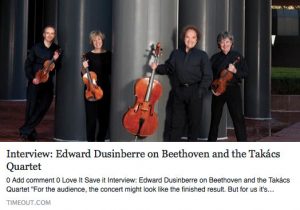Time Out Magazine
Interview: Edward Dusinberre on Beethoven and the Takács Quartet
By Josiah Ng
23 SEP 2016

It’s a rare treat when one of the world’s premier chamber quartets takes on a whole season of music exclusively dedicated to perhaps the most revered composer in history. And it’s an even rarer treat when Hong Kong is included in that ensemble’s tour dates. So we’re honoured that the Takács Quartet is heading to HKU to perform an entire Ludwig van Beethoven-inspired concert, Glimpses of the Immortal. The quartet, first established in 1975 in Hungary, has embarked on a year-long worldwide tour performing Beethoven pieces, with each programme consisting of one early, one middle and one late string quartet piece to capture the composer’s musical evolution. It should come as no surprise, then, that when we chat with lead violinist Edward Dusinberre, the conversation automatically turns to the composer…
Hi Edward! So how do you go about showing Beethoven’s evolution at these concerts?
We’re lucky that we get to play this music in quite a few concerts. On this Asian segment of the tour, we’re playing the same programme five times. This is great because this means we don’t have to be dogmatic. We can try something one evening and then talk about it and then tweak it again for the next evening. It’s a constant process, really. For the audience, it might look like a finished result but for us it’s something that’s constantly evolving.
And this suits the quartet because you’re known for your lively and vivacious interpretations…
Yeah. For me, it’s kind of like going to see an actor who has to play King Lear every night, seven nights a week. If you go and see King Lear and you’ve never seen it before, but you know the actor knows what’s going to happen next, you want to be persuaded that it’s happening for the first time. That’s really our priority.
That sense of immediacy is something that all performing artists try to preserve in each performance. How do you maintain that?
Well, the strange thing is that it’s partly done by rehearsing quite a lot. It sounds like a contradiction but you get very comfortable and sure about what the others are doing. You get to know each other’s playing very well. And that ultimately gives you more flexibility on stage if you’ve tried all the different possibilities during rehearsals and you know the parameters. I think, in Beethoven’s case, it’s very easy to be spontaneous because his whole compositional style came out of a spirit of improvisation. When he was in Vienna, he first became famous as an incredible improviser on the piano.
Do you try to channel that same exploratory spirit?
Yes. Very much. It’s a fine line because some of the pieces are very complicated and there’s a lot going on. So you also have to create a sense of unity and I think the thing which is great about his quartets is that they mirror the challenges we have in our lives. We are often trying to find a balance between change on the one hand and continuity on the other. You start to feel things in the music that you didn’t really know you were capable of feeling. It’s almost like he expands your own emotional vocabulary in certain ways.
What inspires you most about Beethoven?
I think what’s inspiring is that you feel, in the music, a sense of the composer really pushing himself.That’s the thing with Beethoven. He’s always trying something challenging. It doesn’t always work, you could say. There are bits where you say ‘wow, that’s really daring but it doesn’t quite work’. But that’s what’s so inspiring to us as performing musicians. We know we can’t sit back. We also have to push ourselves as hard as we can. I think that’s the most satisfying thing, and also the most draining thing, about playing this programme.

